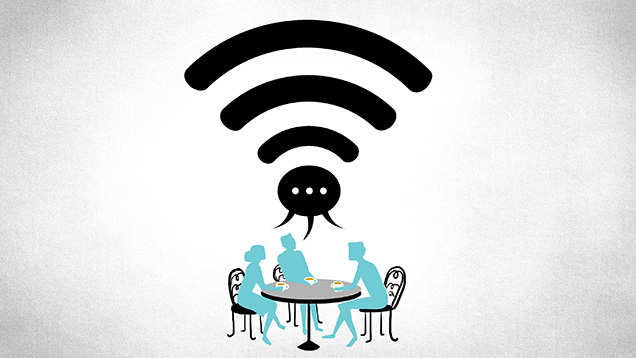The internet has long promised a certain kind of connection between people, one that is now close to being fulfilled: We can reach anyone, at any time, anywhere! But while the web was born in plain text in IRC chat rooms and messageboards, our online conversations were supposed to multimedia, dynamic and visual by now.
“Video and audio streaming will make it much easier for people to chat with voices, and facial expressions, and body language — almost like really being there,” the cyberpsychologst John Suler theorised back in 1996. “When that happens, will text-only chat environments die out?”
Fast-forward nearly 20 years and we’re seeing a boom of apps like Slack, GroupMe, and WhatsApp that suggests online chat is actually more important than it ever was. The promise that Suler noticed in the ’90s is still alive today, out of a new kind of necessity. Group chat rooms are providing a rare space for private conversation in a public internet that’s looking more dangerous than ever. Two decades later, chat is the arguably the only intimate space left online.
Safe spaces
Some of my earliest internet memories come from AOL Instant Messenger. After graduating from AOL’s collection of pre-made group chat rooms (Kids Only, anyone?), I would talk with friends incessantly on the platform from the dark cocoon of the basement where my family’s desktop computer was kept.
GroupMe is the only digital space in the past decade to remind me of the closeness of those formative AIM experiences. I have a GroupMe chat running with a handful of New York friends where we discuss anything and everything the better part of 24 hours a day — work worries, dating, who’s fighting who on Twitter. The app lets us create a miniature social network with its own unique etiquette, obsessions, and memes.
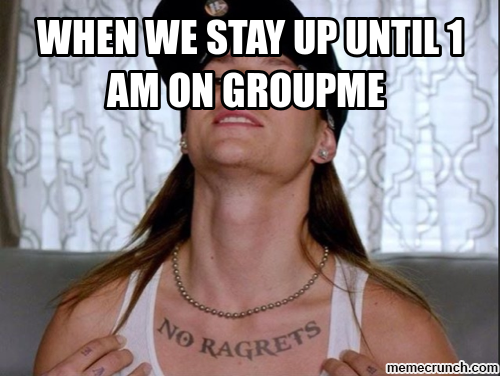
“The first name for the product was ‘groop.ly,’ but quickly developed into something with broader appeal — GroupMe,” the app’s marketing manager Sheila Raju tell me. The name is good branding, sure, but it also calls to my mind a kind of collective subconscious. GroupMe is as intimate a social interaction as I’ve ever had online, and one I’ve come to depend on daily as a digital whisper in my ear.
If Twitter is a megaphone in an urban plaza, then group chats are hushed conversations around cafe tables. GroupMe provides intimacy and authenticity by design.
“In chat we know who our audience is — we can fail,” says Dr. Bernie Hogan, a researcher of human-computer interaction at the Oxford Internet Institute. “We can say something stupid and walk it back in a way that is much more difficult in a public situation.”
Considering the social and professional contacts who might be watching, maintaining public social media presences has become less fun and more work. Group chats are safe places to bullshit with trusted friends.
When the internet turns especially cruel, private chat can be a necessity. Kevin Nguyen, the editorial director at Oyster Books, recently became a target of Twitter harassment by an openly racist white advocacy gang. Tweeting about the barrage only made it worse.
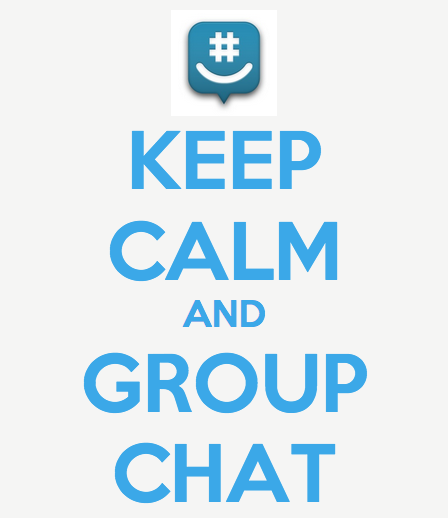
“GroupMe became a great place to air my grievances without feeling like a burden,” he told me. “The distance and space and access it afforded made it really powerful. I could just throw out a thought or a feeling and someone might be around to respond.”
In the absence of strong anti-harassment tools on most major social networks (though Twitter recently promised to improve its blocking function), group chats preserve a corner of the internet for empathy and understanding, intimate emotions that seem to have less and less of a place online. Our small tide pools shelter us from a utopian promise of Suler’s ’90s-era internet — instant connection with all humanity across any distance — that has since become a threat.
The internet clubhouse
From January to October 2014, Slack’s daily active users ballooned from 4000 to over 250,000. Built as a productivity tool for businesses, it’s also being coopted as a GroupMe-style personal chat platform. The appeal is obvious — why limit better group communication to corporations when we could all use a little help?
“Slack is a conduit for culture,” cofounder Stewart Butterfield tells me. Indeed, the platform creates a de=facto online micro-community, like a tide pool away from the larger internet ocean.
“These private spaces allow people to be more provisional and have fun without worrying about what they share or what they say being attached to their internet record,” Alexis Madrigal, executive producer at Fusion and a critic of digital media tells me over email. Madrigal notes that he is in an “indie Slack” for journalists that “functions like the listserves of yore, but in real-time.”
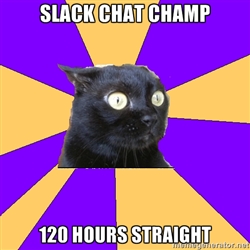
Rather than being created for a specific company or office environment, a so-called indie Slack is an intimate place for friends to hang out online (my younger brother, an Apple engineer, created one to organise a Bay Area apartment hunt with his roommates).
Several such indie Slacks exist as open secrets in the online media world, hosting gossip sessions safe from the consequences of public Twitter. Similar to a locked Instagram profile, users have to be given permission to join a Slack chat room before they can see its contents, ensuring a kind of opt-in privacy.
This members-only clubhouse vibe is crucial to developing an intimate chat culture, but not a panacea for online privacy, it’s worth noting. Slack controls all the information that flows through its servers, and though user data is not yet monetised through tracking or ads, the business model could easily change. For now, the company wants you to know that it won’t touch your chats. “Neither the CEO nor any other executive has access to all user data. Any access is logged and spot audited,” Slack told BuzzFeed.
But when everyone from your boss to the NSA spies on social media, it’s harder than ever to keep a secret. Work Slack is “just the same as a corporate email account,” Choire Sicha argued on The Awl. No matter how intimate it seems, don’t say anything in office chat you wouldn’t want to say to your superior’s face.
Is the intimacy real?
For proof that chat is booming, just look at the many options we now have for sending digital words to each other. We can open up one of Facebook’s new Rooms app to chat with semi-anonymous users about a niche topic of our choice. Or download Ironically, rather than being less personal, the chat environment is “hyperpersonal”, a term coined by psychologist Joe Walther in 1996 to define a condition in which people are conversing from a distance and able to selectively edit the personas they present, which must then be decoded by the listener.
In chat, it’s up to us to determine if a smiley face is flirty or if a “LOL” is sincere, sarcastic, or just a linguistic spaceholder meaning nothing in particular. This isn’t less personal than real life — “Sometimes we can even make it more intimate,” Hogan says. “We read more into it than is often there.”
I tend to agree with Nathan Jurgenson, a sociologist and researcher for Snapchat (which is developing its own chat function), who calls drawing an artificial distinction between life online and off “digital dualism.”
Online communication is just “one flavour of information among others that weaves differently through all of social life,” Jurgenson explains. Rather than assuming everyone we type to online might be a robot, we make sense of chat within the entire context of our relationship with another human being, or group thereof.
Online communication might be imperfect, but having grown up with it, I feel fluent in its subtleties, able to interpret what others truly mean even through the frame of a GroupMe or Slack window. In group chat, I often feel more eloquent than in a large social situation. I’m more sure of what I’m saying and to whom I’m talking, given the help of a split-second delay and @ messages. I feel no different about my virtual self than my real, with all its quirks and flaws.
I think the intimacy of chat enables me to display more facets of my identity, in more ways rather than less, connecting me daily to a more diverse group of people — friends, colleagues, confidants — in farther-flung places than I would ever have access to without these platforms.
As “real life” bleeds into digital and vice-versa, group chats have become a unit of social organisation.
Finding shelter online
In the ’90s, when Suler was delving into his new cyberpsychology, even the public internet was intimate. The entirety of the web in 1996 hosted 36 million users; today, it’s over three billion. Our perception of private versus public space online has changed accordingly, though the change is slow. We’re beginning to realise that the huge social platforms we’ve collectively constructed can be harsh environments to exist in.
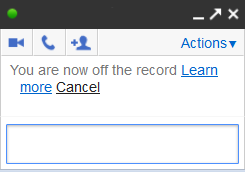
It’s not just the NSA that makes a private internet desirable. We also want to be shielded from each other. Group chats take the benefits of the open internet and social media — effortless communication, instant sharing, a sense of belonging — and shrink them down into something that fits the scale of our personal lives instead of the entire planet.
Suler noticed this concordance when he pointed out the peculiar permanence of chat. We “see beauty in the clean, simple, quiet flow of scrolling words,” he wrote. Text “is an art that must not die.”
The exchange of words in real-time in group chat creates a digital space, I think, where we can resolve the barriers we’ve put up between life online and off, resolving our identity in the same way that my sense of self can seem to snap into place in a bar filled with close friends all talking over each other.
One afternoon in November, my GroupMe chat stopped working. My friends and I tweeted at each other for a while, slyly mourning our private chat in public. We even tried opening a Slack, but the corporate branding just didn’t feel the same. When the bug was fixed and service returned, we rushed back to the GroupMe like a bunch of teenagers returning to the cozy confines of a parent’s basement, secure together.
Picture: Tara Jacoby, Shutterstock
